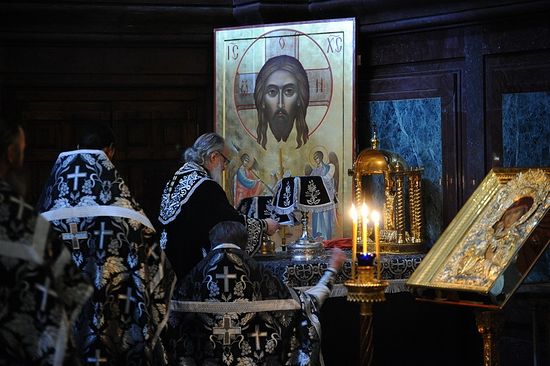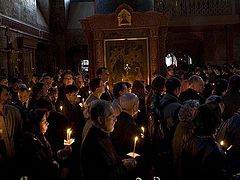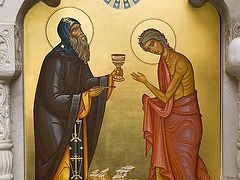Without Me you can do nothing
Jn. 15:5
On Wednesdays and Fridays (and on certain feast days) throughout the entire period of Great Lent, the Liturgy of the Presanctified Gifts is celebrated.
On the first week of Great Lent, according to tradition, most Orthodox Christians approach the Holy Mysteries of Christ after an especially concentrated preparation for confession and Communion, usually on Saturday or Sunday. Communing at the Liturgy of the Presanctified Gifts during the first week of Great Lent are those who due to illness or some other reasonable cause are not able to fast strictly during the five days of this especially important Lenten week. During the other weeks of Lent, anyone who wishes may receive Communion at the Liturgy of the Presanctified Gifts; this does not include infants, who may be communed only at the full Liturgy.
Hymns from the Triodion for the first Wednesday of Great Lent
Let us keep the Fast not only by refraining from food, but by becoming strangers to all the bodily passions; that we who are enslaved to the tyranny of the flesh may become worthy to partake of the Lamb, the Son of God, slain of His own will for the sake of the world, and spiritually may celebrate the feast of the Savior’s Resurrection from the dead. So shall we be raised on high in the glory of the virtues, and through our righteous actions we shall give joy to the Lord who loves mankind (Aposticha at Vespers for Wednesday).
O Lord, Thou hast consecrated and granted unto us this light-giving season of abstinence. Enable all of us to pass through it in compunction and sincerity, living in peace by the power of Thy Cross, O Thou who alone lovest mankind (Sessional hymn at Matins).
From the tree of the Cross there grows for all the world the flower of abstinence. Let us then accept the Fast with love and take pleasure in the fruit of Christ’s divine commandments.
Abstaining from the passions, let us for the Lord’s sake crucify our flesh; by our life in Christ let us all show that the pride of the flesh is dead.
Lifted upon Thy Cross, O Christ, Thou hast raised us up who were fallen into evil. I have slipped into the pit of sin: bring me out and set me firmly on the rock of salvation, that I may glorify Thy power.
Instructions for those entering into the Fast
If the soul of a Christian longs for purity and seeks spiritual health, it should strive with all its might to make use of this time so advantageous for the soul. That is why those who love God appropriately greet each other with the beginning of the Fast.
Physical fasting means nothing without spiritual fasting of the inner man, which consists in guarding oneself from the passions. This fast of the inner man is pleasing to God and will reward you where your physical fasting lacks.
—St. Barsanuphius the Great
Let us apply all our strength so that we might make good use of this brief time, preserving our works pure of all evil, so that we might be saved from the hands of the princes of evil who meet us; for they are wicked and have no mercy.
—Abba Isaiah the Recluse
We shall not behave ourselves like this: today we have temperance and meekness, but in the morning we have intemperance and pride; today we have silence, vigilance, and humility, but tomorrow we have entertainment, unquenchable sleep, insubordination, and everything like that.
—St. Ephraim the Syrian
We must be sure that no matter how hard we try, we can never do anything if we do not make use of help from on high.
—St. John Chrysostom
Truly, if one does not give himself over to be slain like a lamb for every virtue, even the slightest, and does not spill his blood for it, he will never acquire it. Thus has God ordained in His economy, that we should purchase eternal life by voluntary death. You do not wish to die a voluntary death and live in eternal life? Then, you are dead.
—St. Symeon the New Theologian
The sorrow that comes with cutting off sinful habits brings joy as a result, and spiritual well-being urges us towards thankfulness to God for His inexpressible mercy toward us.
—Metropolitan John (Snychev)
Refraining from anger and wrath is our personal work and it requires great ascetic labor; but becoming immoveable and acquiring perfect calmness of heart and perfect meekness—this can only be the work of God in us.
—St. Symeon the New Theologian
A Christian cannot produce any desired change in himself of his own accord, and Christ will not reward him for any such change if he does not commit himself to Christ with all his heart.
—St. Symeon the New Theologian
On the Prayer of St. Ephraim the Syrian
"O Lord and Master of my life! A spirit of idleness, despondency, ambition, and vain talk give me not; but rather a spirit of chastity, humble-mindedness, patience and love bestow upon me Thy servant. [And further, Yeah O Lord King, grant me to see my failings and not condemn my brother, for Thou art holy unto the ages of ages.]"
This is the prayer that you, brothers and sisters, have heard many times in church during these days. It was written by St. Ephraim the Syrian, a pastor and teacher of the flock of Christ, who lived in the fourth century A.D. and left this inheritance to the Church; and the Church has commanded that we pronounce it during the days of Great Lent at every divine service, except on Saturdays and Sundays.
Why did the holy Church introduce this prayer and not another into the services of Great Lent? In order to remind us what we must ask and beg of the Lord at the threshold of fasting and repentance. Just as a mother guards her children from catching a cold, so does the Church guard us now from temptation, hinting to us about the angle that temptations make take against us and by what means we can deflect them. Feeling the tenderness of the Church's maternal care for our salvation, let us redouble our attention and enter into accord with her good intentions for us, and follow her instructions as children follow their mothers' counsel.
When the holy Church has us pray to the Lord during fasting and repentance for the banishment from us of the spirit of idleness, despondency, ambition, and vain talk, she shows that this particular spirit attacks us during the time of Lent more than at any other. In fact, what time is more convenient for exercise in God's word than the time dedicated to preparing ourselves for confession and Communion? Yet it is during this time that the spirit of idleness tempts us the most! What time is more opportune for spiritual contemplation than the time dedicated to attending church and hearing there soul-saving prayers, readings, and hymns? Yet it is during this time that impure thoughts enter our thoughts! What time is better for exercising silence than the time of repentance? And yet this is the time that we most tend to engage in the vain talk!
Isn't that so? But someone who fasts and goes to church only out of need does not notice these temptations; whereas someone who fasts properly and prays in church as he should will understand the whole importance of the prayer the Church now puts to use.
What is the spirit of idleness? It is idleness of mind in the work of correcting ourselves. The mind should exercise itself in the word of God, penetrate the reading of the prayers, encourage us toward the ascetic labor of fasting and prayer, reflect over our behavior as it compares with Christ's commandments, admit our limitations in our inadequacies and errors, and fulfill the requirements of the faith. But when the mind does none of this, isn't it idle, distracted, and immersed in sensualness? Pity the person who fasts but has the spirit of idleness inside: he wears himself out, but receives no benefit.
What is the spirit of despondency? It is the sorrow of an idle spirit. It pines for the pleasures it delighted in before the fast; it sorrows because it cannot break the rule of the Church without reproach from its conscience, and it sighs when it sees Lenten food. And doesn't this spirit of despondency and boredom burden a person more than the most austere fasting? Isn't it more harmful to your health than simple, artless food? Pity the person who longs for pleasures during the fast. The human mind invented pleasures, while fasting was established by God Himself.
What is ambition? It is the pride of life. Whoever fasts while having it, fasts only outwardly. But is outward fasting pleasing to God? The Pharisee fasted but received no benefit; to the contrary, the publican did not fast, but he was preferred over the Pharisee. Obviously it is because one was filled with the pride of life while the other had a humble heart and broken spirit.
What is the spirit of vain talk? It is the passion for empty chatter, which comes partly from a dull mind, partly from idleness, and partly from envy and anger. But no matter where this passion comes from, it is the most dangerous passion. That is because every idle word that penetrates into the soul of our neighbor—if it is not immediately quelled—will become the seed of evil that sprouts, grows, and bears fruit. Do not think that a word released into the air will disappear into air. No! For every idle word men may speak, they will give account of it in the day of judgment (Mt. 12:36), says the Lord Himself.
—Metropolitan Nicanor of Novgorod and St. Petersburg









Would you help me understand why infants won't receive communion at the Pre-Sanctified Liturgies.
Forgive me a sinner.
Fr. Peter